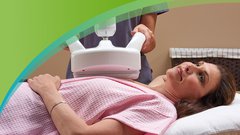October is Breast Cancer Awareness Month, and OSF HealthCare is at the forefront of breast care by offering the Invenia ABUS 2.0 (Automated Breast Ultrasound System).
ABUS is approved by the Food and Drug Administration (FDA) for breast cancer screening as an adjunct to mammography for women with dense breast tissue.
OSF HealthCare offers ABUS at five out of its hospitals, including: OSF Little Company of Mary Medical Center, OSF Saint Francis Medical Center, OSF Saint Joseph Medical Center, OSF Saint Anthony Medical Center, and OSF Sacred Heart Medical Center.
“We are excited to add the ABUS screening tool to our comprehensive breast cancer screening program. By offering ABUS in addition to mammography for our patients with dense breast tissue, we anticipate improving detection for small cancers that cannot be seen on a mammogram alone in these women. We believe ABUS will become an integral part of our practice for the detection of breast cancer,” said Dr. Jilma Patrick, fellowship-trained breast surgeon with OSF HealthCare Little Company of Mary Medical Center.
According to studies published in JAMA, dense breast tissue has been found to be the most common risk factor for the development of cancer and also makes cancer more difficult to detect using mammography. The difficulty that many radiologists experience when reading mammograms is that both dense tissue and cancer appear white on a mammogram. With ABUS, suspicious masses appear black against the white dense tissue.
In early 2019, a national density inform law was passed that mandates that the FDA update mammography reporting so that women be notified if their breasts are dense. Providers may offer supplemental imaging as appropriate to help find cancers hiding in dense breast tissue.
“Mammography is the gold standard for the detection of breast cancer; however, it doesn’t work equally well in all women, particularly those with dense breast tissue,” added Dr. Patrick. “Designed and built specifically for screening, research shows that ABUS technology as an adjunct to mammography has the potential to find nearly 36% additional cancers that would not have been found with mammography alone.”
It is recommended women get regular mammograms beginning at age 40 or earlier depending on family history, and if they have been told that they have dense breast tissue, they should talk to their doctor or radiologist about their specific risk and additional screening tests that might be appropriate.
To learn more or to schedule your screening mammogram, go to www.osfhealthcare.org.
For further information about Invenia ABUS 2.0, visit www.gehealthcare.com/inveniaabus.

